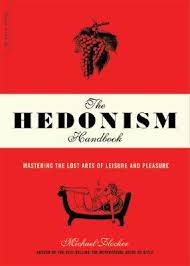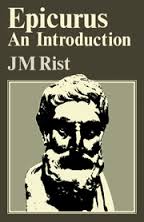Perhaps surprising to some, hedonism is also a common theme in Christian literature. Read the following excerpt from John Piper, in which he explains how he became a “Christian Hedonist.”
From Desiring God
When I was in college I had a vague, pervasive notion that if I did something good because it would make me happy, I would ruin its goodness.
I figured that the goodness of my moral action was lessened to the degree I was motivated by a desire for my own pleasure. At the time, buying ice cream in the student center just for pleasure didn’t bother me, because the moral consequences of that action seemed so insignificant. But to be motivated by a desire for happiness or pleasure when I volunteered for Christian service or went to church-that seemed selfish, utilitarian, mercenary.
This was a problem for me because I couldn’t formulate an alternative motive that worked. I found in me an overwhelming longing to be happy, a tremendously powerful impulse to seek pleasure, yet at every point of moral decision I said to myself that this impulse should have no influence.
One of the most frustrating areas was that of worship and praise. My vague notion that the higher the activity, the less there must be of self-interest in it, caused me to think of worship almost solely in terms of duty. And that cuts the heart out of it. Then I was converted to Christian Hedonism. In a matter of weeks I came to see that it is unbiblical and arrogant to try to worship God for any other reason than the pleasure to be had in him. Let me describe the series of insights that made me into a Christian Hedonist. Along the way I hope it will become clear what I mean by this strange phrase.
During my first quarter in seminary I was introduced to the argument for Christian Hedonism and one of its great exponents, Blaise Pascal. He wrote,
“All men seek happiness. This is without exception. Whatever different means they employ, they all tend to this end. The cause of some going to war, and of others avoiding it, is the same desire in both, attended with different views. The will never takes the least step but to this object. This is the motive of every action of every man, even of those who hang themselves.”
This statement so fit with my own deep longings and all that I had ever seen in others that I accepted it and have never found any reason to doubt it. What struck me especially here was that Pascal was not making any moral judgment about this fact. As far as he was concerned, seeking one’s own happiness is not a sin; it is a simple given in human nature. It is a law of the human heart as gravity is a law of nature.
This thought made great sense to me and opened the way for the second discovery. I had grown to love the work of C. S. Lewis in college. But not until later did I buy the sermon called “The Weight of Glory.” The first page of that sermon is one of the most influential pages of literature I have ever read. It goes like this:
“If you asked twenty good men today what they thought the highest of the virtues, nineteen of them would reply, Unselfishness. But if you asked almost any of the great Christians of old he would have replied, Love. You see what has happened? A negative term has been substituted for a positive, and this is of more than philological importance. The negative ideal of Unselfishness carries with it the suggestion not primarily of securing good things for others, but of going without them ourselves, as if our abstinence and not their happiness was the important point. I do not think this is the Christian virtue of Love. The New Testament has lots to say about self-denial, but not about self-denial as an end in itself. We are told to deny ourselves and to take up our crosses in order that we may follow Christ; and nearly every description of what we shall ultimately find if we do so contains an appeal to desire.
“If there lurks in most modern minds the notion that to desire our own good and earnestly to hope for the enjoyment of it is a bad thing, I submit that this notion has crept in from Kant and the Stoics and is no part of the Christian faith. Indeed, if we consider the unblushing promises of reward and the staggering nature of the rewards promised in the Gospels, it would seem that Our Lord finds our desires not too strong, but too weak. We are halfhearted creatures, fooling about with drink and sex and ambition when infinite joy is offered us, like an ignorant child who wants to go on making mud pies in a slum because he cannot imagine what is meant by the offer of a holiday at the sea. We are far too easily pleased.”
There it was in black and white, and to my mind it was totally compelling: It is not a bad thing to desire our own good. In fact the great problem of human beings is that they are far too easily pleased. They don’t seek pleasure with nearly the resolve and passion that they should. And so they settle for mud pies of appetite instead of infinite delight.
I had never in my whole life heard any Christian, let alone a Christian of Lewis’s stature, say that all of us not only seek (as Pascal said) but also ought to seek our own happiness. Our mistake lies not in the intensity of our desire for happiness, but in the weakness of it.
The third insight was there in Lewis’s sermon, but Pascal made it more explicit. He goes on to say,
“There once was in man a true happiness of which now remain to him only the mark and empty trace, which he in vain tries to fill from all his surroundings, seeking from things absent the help he does not obtain in things present. But these are all inadequate, because the infinite abyss can only be filled by an infinite and immutable object, that is to say, only by God Himself.”
As I look back on it now it seems so patently obvious, I don’t know how I could have missed it. All those years I had been trying to suppress my tremendous longing for happiness so I could honestly praise God out of some “higher,” less selfish motive. But now it started to dawn that this persistent and undeniable yearning for happiness was not to be suppressed but was to be glutted-on God! The growing conviction that praise should be motivated solely by this happiness we find in God seemed less and less strange.
The next insight came again from C. S. Lewis, but this time from his Reflections on the Psalms. Chapter nine of this book bears the modest title “A Word about Praise.” In my experience it has been the word about praise-the best word on the nature of praise I have ever read.
Lewis says that as he was beginning to believe in God, a great stumbling block was the presence of demands scattered through the Psalms that he should praise God. He did not see the point in all this; besides, it seemed to picture God as craving “for our worship like a vain woman who wants compliments.” He goes on to show why he was wrong.
“But the most obvious fact about praise-whether of God or anything-strangely escaped me. I thought of it in terms of compliment, approval, or the giving of honor. I had never noticed that all enjoyment spontaneously overflows into praise…. The world rings with praise – lovers praising their mistresses, readers their favorite poet, walkers praising the countryside, players praising their favorite game….
“My whole, more general, difficulty about the praise of God depended on my absurdly denying to us, as regards the supremely Valuable, what we delight to do, what indeed we can’t help doing, about everything else we value.
“I think we delight to praise what we enjoy because the praise not merely expresses but completes the enjoyment; it is its appointed consummation.”
This was the capstone of my emerging hedonism. Praising God, the highest calling of humanity and our eternal vocation, did not involve the renunciation but rather the consummation of the joy I so desired. My old effort to achieve worship with no self-interest in it proved to be a contradiction in terms. Worship is basically adoration, and we adore only what delights us. There is no such thing as sad adoration or unhappy praise.
We have a name for those who try to praise when they have no pleasure in the object. We call them hypocrites. This fact-that praise means consummate pleasure and that the highest end of man is to drink deeply of this pleasure-was perhaps the most liberating discovery I ever made.
Then I turned to the Psalms for myself and found the language of hedonism everywhere. The quest for pleasure was not even optional, but commanded: “Delight yourself in the Lord; and he will give you the desires of your heart” (Psalm 37:4).
The psalmists sought to do just this: “As the deer pants for the water brooks, so my soul pants for thee, O God, for the living God” (Psalm 42:1-2). “My soul thirsts for thee, my flesh yearns for thee, in a dry and weary land where there is no water” (Psalm 63:1). The motif of thirsting has its satisfying counterpart when the psalmist says that men “drink their fill of the abundance of thy house; and thou dost give them to drink of the river of thy delights” (Psalm 36:8).
I found that the goodness of God, the very foundation of worship, is not a thing you pay your respects to out of some kind of disinterested reverence. No, it is something to be enjoyed: “O taste and see that the Lord is good” (Psalm 34: 8) . “How sweet are thy words to my taste! Yes, sweeter than honey to my mouth!” (Psalm 119:103).
As C. S. Lewis says, God in the Psalms is the “all-satisfying Object.” His people adore him unashamedly for the “exceeding joy they find in him” (Psalm 43:4). He is the source of complete and unending pleasure: “In thy presence is fullness of joy; in thy right hand there are pleasures forever” (Psalm 16:11).
That is the short story of how I became a Christian Hedonist. I have now been brooding over these things for some eighteen years, and there has emerged a philosophy that touches virtually every area of my life. I believe it is biblical, that it fulfills the deepest longings of my heart, and that it honors the God and Father of our Lord Jesus Christ. I have written this book [Desiring God] to commend these things to all who will listen.
—
John Piper has summed up his view of Christian Hedonism this way: “God is most glorified in us when we are most satisfied in Him.” Watch the following video entitled “Jesus and the Journey to Joy: What is Christian Hedonism?” in which Piper gives a brief overview of his conviction and its merits.









